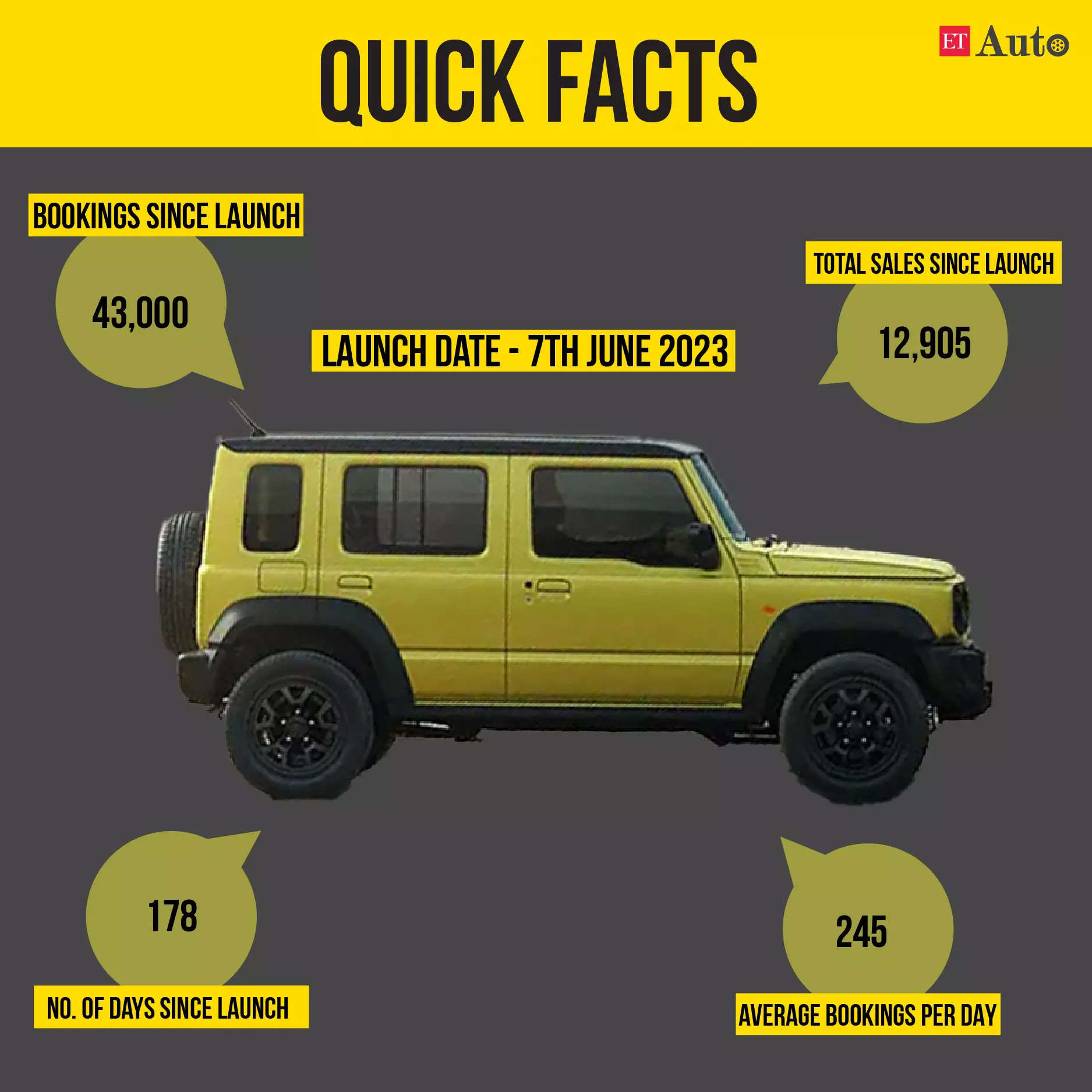
New Delhi: Raney Virdi from Karol Bagh couldn’t stop boasting of his new red Jimny. “There are places in the world only the Jimny can go,” he proudly quoted the company’s new TVC while landing a loud thump on the bonnet. “Yes, but how many are going there?”
It is still a question that needs to be answered. Just after six months of the launch, India’s largest carmaker offers its Thunderstorm edition at a starting price of INR 10.74 lakh making it cheaper by INR 2 lakh than the price it was launched on June 7, 2023. At this price, the Jimny is nearly INR 4 lakh cheaper than the entry-level Mahindra Thar petrol 4WD MT with a hard top. But do the Indian car buyers care?

Moreover, data from the Society of Indian Automobile Manufacturers (SIAM) suggests that sales of the globally popular off-roader SUV Jimny is struggling on the sales chart with a drop to as low as 1,100 units in November at its 478 Nexa dealerships PAN India.
The company claims that there were some issues with production availability for automatic transmission vehicles, which led to a shortage of supply. On other hand, industry experts and analysts cite higher pricing, lack of positioning and a very niche market for offroading in the Indian market as the primary reasons for the falling sales in spite of the heavy discounts offered by the company.
Replicating global success in India?
Maruti Suzuki Jimny, when launched in India, was part of Maruti Suzuki’s strategy to capture the utility vehicle market which it was lagging along with the compact SUV Fronx and a premium MPV Invicto. Eventually, in the first half of 2023-24, Maruti overtook Mahindra to become the country’s largest SUV maker. The company recorded 25.83% share in the first half of the ongoing fiscal year compared to 16.65% in the same period last fiscal.
Globally, Suzuki has sold over 3.2 million units of the Jimny three door version in 199 countries and regions.
Maruti Suzuki Jimny is a globally glorified product with countries using it for everything from plowing snow in Regensburg, Germany, to being used as a Kei car in Japan for tax and investment benefits. But for a country like India that is currently obsessed with the idea of SUVs in every form and format, why isn’t the market head-over-heels in love with a true off-roader in a 4X4 mechanism that offers better space and ride quality than its immediate rivals?

The Jimny seems to be dwindling in terms of relevance and sales numbers and it has less to do with the product and more with its perception.
In earlier interactions with media, Maruti Suzuki had highlighted that it is not really eyeing volumes from Jimny compared to other products in the portfolio. But it is showing the Indian customers its off-roading capability and its rub-off effect on other SUVs it sells.
On the sliding sales, Shashank Srivastava, Senior Executive Officer, Marketing & Sales, Maruti Suzuki India, told ETAuto, “The production for automatic transmission was only 40% against an overall demand of 50%-52%. As a result, we produced manual transmission Jimny in more numbers than the actual market demand and this is reflected in the higher stock of manual transmission of Jimny.
“We anticipate that this problem of the limited availability of automatic transmissions will continue in the near future as well. Because of this skew and availability of year-end inventory at the dealership, there is a discount being offered on the Jimny, depending on different geographies,” he added.
He also highlighted that demand isn’t an issue; the company has so far recorded 43,000 bookings.
Price parity or off-road scarcity?
In terms of pricing, “we have seen some resistance from the consumer in accepting the starting price point of the Jimny,” Srivastava said.
“According to our research, it is slightly higher than the expectation and if we go into details, we see that the buyers are also comparing it with competing vehicles in the market, which have a two-wheel drive version as well. Jimny has a four-wheel drive as standard which makes it costlier than the two-wheel drive version. Jimny is a five-door car and therefore it cannot be directly compared with a two-wheel drive or a three-door car available in the competition,” he said.
Maruti Suzuki Jimny is probably like Micheal Phelps in a kiddie pool. It packs a hearty all-terrain 4-wheel drive for a market that is yet to have an off-road culture. India isn’t big on modifications as well, further diminishing the possibilities of ‘making it large’, pun intended. Despite being a 5-door SUV, the dimensions are quite compact.
Variant-wise discounts available on Maruti Suzuki Jimny
(Official data and dealership sources)
Avik Chattopadhyay, founder, Expreal, said, “The average Indian SUV buyer is buying the SUV not because it is an SUV in function but because it is an SUV in form.” The usable width has increased by mere 80 mm since the Gypsy in 1993. So where is the road presence India is all about?
“The current state of the Jimny is due to undifferentiated customer segmentation and targeting. It is a thoroughbred off- road vehicle and not a lifestyle vehicle like the Thar. Also, its utility can be experienced in institutional applications, beyond individuals. The off-roading enthusiasts have already bought or booked the Jimny. MSIL now needs to target other niche segments and not follow the Thar. The situation is not beyond repair at all, but the dangerous trend of a discounted price point is being set which one cannot easily retrace from,” Avik told ETAuto.
Maruti Suzuki Jimny RWD not on the cards
The next question lies if the Jimny will be offered in a rear-wheel-drive (RWD) anytime soon. If you’d been pooling your money to get one, Maruti Suzuki is not planning to introduce any two- wheel model drive to Jimny as there will be brand dilution, Srivastava said.
“This brand is known globally for off-roading capabilities and therefore, it will probably dilute the brand if we were to introduce it, that is the current thinking. We will continue to make efforts to streamline production according to the underlying demand pattern and with the introduction of the new accessory kits, we expect that going forward the sales for Jimny should be further strengthened,” he added.
Jimmy also does not have a diesel version which is preferred by some customers. In fact, the category in which Jimny operates, i.e., Petrol variant in four-wheel drive, its market share is over 75% since its introduction, Srivastava said.
While shedding some light on the 4X4 culture in India, Tutu Dhawan, the automotive restoration expert, said, “90% of the buyers don’t even understand what you mean by 4X4. It is only specific. I would say not more than 5% to 10% of people who specifically want a 4X4 and you end up paying a premium price for something which you are not going to use.”
Vinay Piparsania, Former Director – Marketing and Sales, Ford India, believes that each brand has its own sort of presence and superiority or consideration in that category. “So I think that’s where Maruti Suzuki continues to be known as more of a functional vehicle. Not necessarily the best brand in that class, right? It is also because there is no off-roading culture in India and there is no real demand for it. But that’s the reason Thar came into RWD version’s cheaper variant, because ultimately it was delivering only the road presence, not the 4X4 feature.”
In Conclusion
Maruti Suzuki’s Jimny, touted as a global off-roading sensation, finds itself at crossroads in the Indian market. Despite initial aspirations to capture the utility vehicle market and secure the title of the country’s largest SUV maker, the Jimny faces challenges that extend beyond production hiccups and discount strategies.
The Thunderstorm edition’s discounted price, now significantly more affordable than rivals like the Mahindra Thar, has sparked questions about the Indian consumer’s response. Sales data from November reveals a sharp decline, attributed in part to production limitations on automatic transmission vehicles, creating an imbalance in stock.
While Maruti Suzuki emphasizes that demand isn’t the issue, experts argue that higher pricing, niche positioning, and a lack of off-roading culture in India contribute to the model’s struggle. The Jimny’s five-door design, compact dimensions, and standard four-wheel-drive system differentiate it from competitors, potentially impacting its perceived value.
In the broader context, the Jimny’s fate in India is intertwined with the country’s SUV-buying psyche. The average Indian SUV buyer, driven by form rather than function, may be hesitant to embrace a thoroughbred off-roader. The absence of a rear-wheel-drive option and a diesel variant further limit its market appeal.

















